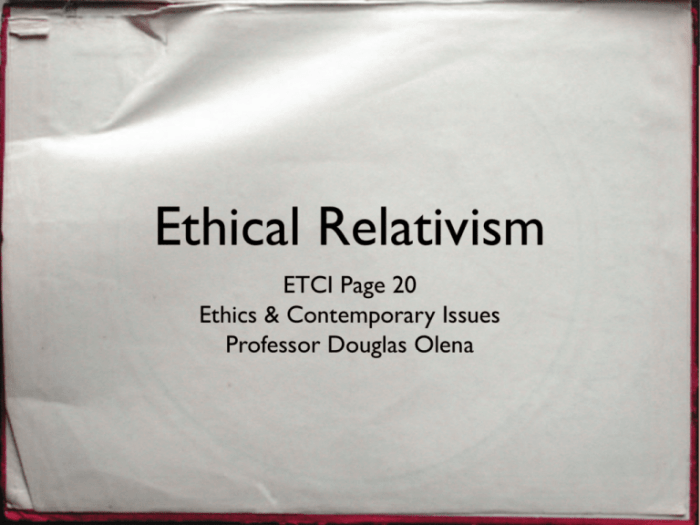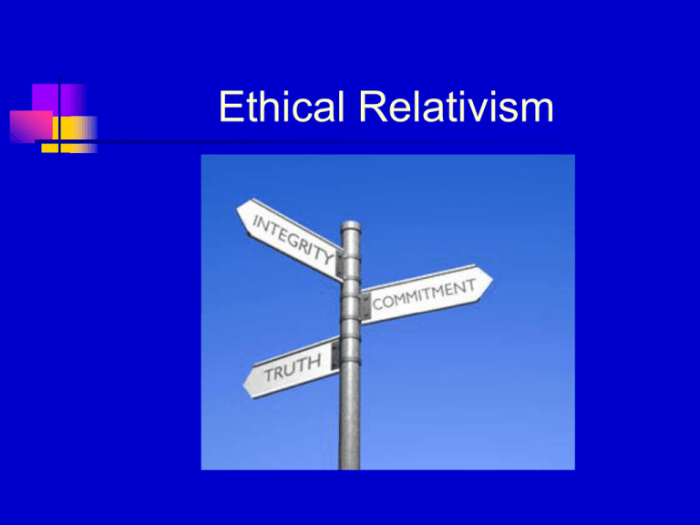When ethical relativism is put into practice it implies that – When ethical relativism is put into practice, it implies that moral standards and values are not absolute but rather vary across cultures and societies. This concept challenges the notion of universal ethical principles and raises important questions about the nature of morality and the basis for ethical decision-making.
Ethical relativism has significant implications for cross-cultural understanding, international relations, and the field of anthropology. It compels us to question our own cultural biases and to approach ethical dilemmas with an open mind, recognizing the validity of diverse perspectives.
Ethical Relativism in Practice: Implications: When Ethical Relativism Is Put Into Practice It Implies That

Ethical relativism posits that moral values and ethical principles are not absolute or universal but vary depending on the individual, culture, or society. This has significant implications for ethical decision-making, as it suggests that there is no objective or universally applicable standard of right and wrong.When
ethical relativism is put into practice, it implies that:
- Moral judgments are made relative to the cultural or societal context in which they are made.
- There is no objective or universal standard of right and wrong.
- Ethical principles and values are subject to change over time and across cultures.
- Individuals and societies should respect the ethical beliefs and practices of others, even if they differ from their own.
Subjectivity and Cultural Differences, When ethical relativism is put into practice it implies that
Cultural differences play a significant role in shaping ethical beliefs and practices. Each culture develops its own set of moral values and ethical norms, which are influenced by factors such as history, religion, social structure, and economic conditions. Ethical relativism accommodates diverse cultural perspectives by recognizing that there is no single, universally applicable set of ethical principles.
- Different cultures have different ethical codes and standards of conduct.
- Ethical beliefs and practices are influenced by cultural values and norms.
- Ethical relativism allows for the coexistence of different ethical systems.
Universal Values vs. Cultural Relativism
Ethical relativism is often contrasted with the concept of universal ethical values. Universal ethical values are those that are considered to be true and applicable to all people, regardless of their culture or background. Some examples of universal ethical values include the value of human life, the importance of justice, and the need for compassion.The
tension between universal ethical values and cultural relativism arises when ethical dilemmas challenge the boundaries of cultural relativism. For example, some cultural practices, such as female genital mutilation, may be considered unethical by universal standards, even if they are accepted in certain cultures.
- Universal ethical values are considered true and applicable to all people.
- Cultural relativism allows for different ethical systems to coexist.
- Ethical dilemmas can arise when cultural practices conflict with universal ethical values.
Moral Pluralism and Ethical Relativism
Moral pluralism is the view that there is not one single, true morality but rather a plurality of valid moral perspectives. Moral pluralism is closely related to ethical relativism, as it also rejects the idea of objective or universal ethical values.
However, moral pluralism goes further than ethical relativism by arguing that different moral perspectives can be equally valid and reasonable, even if they conflict with each other.
- Moral pluralism recognizes the validity of multiple moral perspectives.
- Ethical relativism rejects the idea of objective or universal ethical values.
- Moral pluralism can be challenging to apply in practice, as it can lead to conflicts between different moral perspectives.
Ethical Decision-Making in a Relativistic Context
Ethical decision-making in a relativistic context requires careful consideration of both cultural and universal perspectives. It is important to respect the ethical beliefs and practices of others, even if they differ from our own. However, it is also important to uphold universal ethical values, such as the value of human life and the importance of justice.
- Ethical decision-making in a relativistic context requires considering both cultural and universal perspectives.
- It is important to respect the ethical beliefs and practices of others.
- Universal ethical values, such as the value of human life, should be upheld.
Practical Applications of Ethical Relativism
Ethical relativism has practical applications in fields such as anthropology, cross-cultural communication, and international relations. In anthropology, ethical relativism helps researchers understand and interpret the ethical beliefs and practices of different cultures. In cross-cultural communication, ethical relativism helps individuals communicate effectively with people from different cultural backgrounds.
In international relations, ethical relativism helps policymakers develop policies that are respectful of different cultural values.
- Ethical relativism has practical applications in anthropology, cross-cultural communication, and international relations.
- In anthropology, ethical relativism helps researchers understand and interpret different cultures.
- In cross-cultural communication, ethical relativism helps individuals communicate effectively with people from different backgrounds.
- In international relations, ethical relativism helps policymakers develop policies that are respectful of different cultural values.
Expert Answers
What are the key implications of ethical relativism?
Ethical relativism implies that moral standards are not absolute but vary across cultures and societies, challenging the notion of universal ethical principles.
How does ethical relativism accommodate diverse cultural perspectives?
Ethical relativism recognizes the validity of different cultural perspectives and encourages open-mindedness and dialogue in ethical decision-making.
What is the relationship between ethical relativism and moral pluralism?
Moral pluralism acknowledges the existence of multiple, equally valid moral perspectives, which is closely related to ethical relativism’s emphasis on cultural diversity.
What are the challenges of applying ethical relativism in practice?
Applying ethical relativism in practice can be challenging, as it requires balancing cultural sensitivity with the need to address universal human rights concerns.


